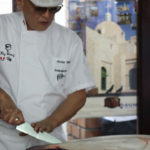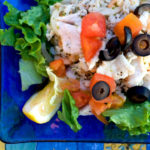Peru’s cuisine is taking the world by storm and one of Peru’s most popular and well-known restaurants, Osaka continues to serve up some of the finest Peruvian-Japanese fusion food. With 2 restaurants in Lima, 2 in Buenos Aires, and 1 in both Santiago de Chile and Sao Paulo; the Osaka brand continues to grow and spread the delicious dishes from Peru. Earlier in the week we caught up with the Executive Chef of both Buenos Aires Osaka restaurants, Eddie Castro, to find out more about Peruvian food and its explosive popularity. Eddie Castro has been part of Osaka since its inception about 10 years ago where he worked his way up from the bottom to become the head chef of the Osaka Lima restaurant. He was then sent to open up an Osaka restaurant in Los Angeles whilst acting as an advisor to the restaurant located in Mexico City. Two years ago, Osaka announced that it would be arriving to Argentina, and Eddie was chosen to head up the two restaurants which are today regarded as some of the best places to eat at in the whole of Buenos Aires.

Eddie Castro, the Executive Chef at Osaka Argentina / Source
♦ What is the current situation of Peruvian food today?
Today, it is one of the most admired cuisines in the world! Peru has a wide range of products and fusions with other cuisines which has made it so unique and as a result of this we also have several restaurants which are regarded as some of the best in the world. It is great to see that there are so many Peruvian chefs that are known throughout the world as this in turn has helped Peruvian cuisine cross borders more easily and gain popularity.
♦ What would you define as the essential elements that make Peruvian food so unique?
Principally it is the nature of the raw materials. Geographically, Peru has direct access to the sea and a very stable climate all year round. Our great variety of fish and seafood gives us the added bonus that you can try the best of the sea at any family table or on the menu of any restaurant. Peru has a diverse range of fruit, vegetables and spices which are available almost all year round. It is also interesting to mention, that there are a number of Creole recipes which are produced and consumed in all social strata. Overall, Peru has the largest variety of potatoes in the world and we also consume a lot of grains and cereals. In Peruvian cuisine we also integrate the different cultures that arrived in Peru with the immigrants, most noticeably from China and Japan.

Osaka is the fusion of Peruvian-Japanese cuisine / Source
♦ Why do you think that Peruvian food has become so popular and fashionable around the world?
From the nouvelle cuisine of France to the molecular dishes of the Spanish chef, Ferran Adria; food like any other item goes in and out of fashion! As the flag bearer of popular Peruvian food, about 10 years ago, Gaston Acurio began raising awareness and exposure of Peruvian food and products. This led to the rapid explosion in the popularity of Peru’s cuisine which finally began traveling outside of its own borders and around the world. Another factor for its popularity is the influence and integration of both the eastern cuisines of China and Japan and the western cuisines of France.
♦ How has ceviche evolved in Peru?
Ceviche began as a popular dish in Peru many years ago and in its most common form, the ceviche was made using tuna and Peruvian weakfish. Today, ceviche has transformed into a popular stylized soup, and thanks to the evolution of Peruvian food and chefs, ceviche is becoming Peru’s signature dish and is now competing against the many other international dishes from around the world. However, I must add that when it comes to ceviche, no matter the occasion, the person’s economic status or the destination in Peru, you will always be able to find a good, fresh ceviche nearby and at a good price!

Sacha Ceviche at Osaka Restaurant / Source
♦ Aside from ceviche, what other Peruvian dishes would you say are fundamental to Peruvian cuisine?
The most popular and fundamental to Peruvian cuisine are; causas, tiradito (similar to fish sashimi with a spicy sauce), anticuchos (grilled skewered meat), papa a la huacaína (salad of boiled yellow potatoes & spicy huacaína sauce), carapulcra (pork stew with rice and potatoes), tamale (corn-based dough filled with meat and boiled within a leaf), chupe de camarones (shrimp stew/soup)…actually there are too many to list, there are a lot more!
♦ What is it that makes the perfect Pisco Sour and why?
The careful balance between just the right amounts of lime and sugar (usually in the form of syrup) and also the Pisco Sour having a good clear quality. I always like to use organic eggs from the countryside and for me what makes the perfect Pisco Sour is a high quality pisco. Personally, I prefer a Pisco Sour when it is made with ‘acholada’ which is a blend of two or more Pisco grapes, as it makes the Pisco Sour even more aromatic and fresh.

A range of Osaka’s Pisco Sours / Source
♦ Where did the idea of Osaka come from?
About 10 years ago, the owners used to travel a lot to Asia, and it was there they tried the food and cuisine of the East. Whilst traveling through Asia, they came up with the idea for Osaka and creating the fusion between Peruvian products and the techniques used in Japanese cooking.
♦ What is your opinion about Peruvian food in Argentina?
Peruvian cuisine is building a good reputation in the local Argentinean market. I strongly believe that it is influencing both the palate and the society as with its diversity and variety it is becoming more popular and the consumers are looking for and enjoying the mix of cultures. In Argentina, Peruvian food is acting as a source of information about the culture and country of Peru and if I had to define the current situation of Peruvian food in Argentina in one word, it would be; influential!

Elegant interior of Osaka Puerto Madero, Buenos Aires / Source
♦ What is your favorite Peruvian dish and why?
My favorite Peruvian dish of all time is arroz con pollo (chicken with rice) with papa a la huacaína, Creole salsa and hot rocoto peppers. It has been my favorite since childhood and continues to be my favorite today even throughout my career as a chef!
♦ If somebody had never tried Peruvian food before, arrived at Osaka, what would be the dish that you would serve so that they would have an idea about Peruvian food?
I would make them a ‘sakana ishiyaki’ which is made with grilled sashimi-style fish on a pad of aromatic herbs served half-seared on a hot stone and drizzled with an emulsion of pachamanca marinade and sprinkled with togarashi. This dish and an Osaka specialty, clearly demonstrates the fusion and marriage between Peruvian cuisine and the use of Japanese cooking techniques.

Sakana Ishiyaki at Osaka / Source
Osaka
With restaurants located in Buenos Aires (Argentina), Lima (Peru), Santiago de Chile (Chile) and São Paulo (Brazil); don’t forget to make your reservation at osaka.com.pe for an unforgettable dining experience during your vacation in South America!
Thanks for visiting our Central & South America Travel Blog! Feel free to contact one of our Travel Specialists via email, phone or chat to plan your perfect Peru itinerary.




